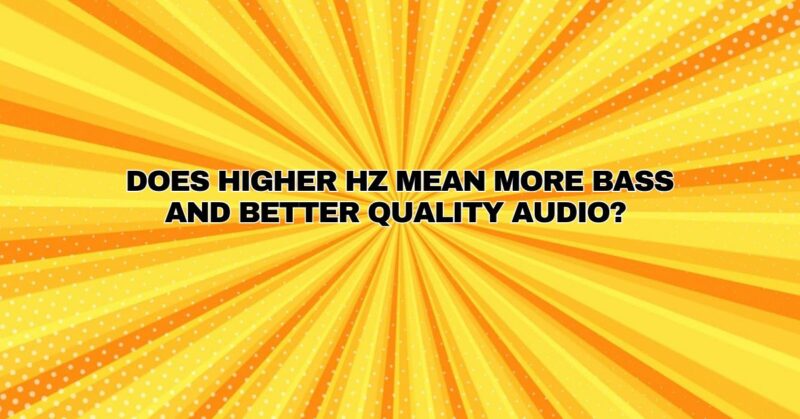In the world of audio, the quest for the perfect balance between higher Hz, more bass, and better audio quality has been a long-standing pursuit. Many believe that a higher Hz (Hertz) rating equates to deeper bass and superior audio fidelity. However, the relationship between Hz, bass, and audio quality is far more intricate. In this comprehensive article, we will explore the complexities of Hz, bass frequencies, and audio quality, helping you understand the nuances and dispel some common misconceptions.
Understanding Hz in Audio
Before we delve into the connection between Hz and audio quality, it’s essential to comprehend what Hz represents in the context of sound and music.
- The Hz Scale: Hertz (Hz) is a unit of measurement that quantifies the frequency of sound waves. It denotes the number of oscillations (cycles) of a sound wave that occur per second. In the realm of audio, Hz is used to describe the pitch or frequency of sounds.
Hz, Bass Frequencies, and Audio Quality
One of the prevalent misconceptions is the belief that higher Hz values equate to more bass and better audio quality. This misconception arises from a mix of factors, including the desire for deeper bass, marketing tactics, and technical specifications. Let’s clarify the relationship between Hz and these elements:
1. Deeper Bass Frequencies:
- Sub-Bass Frequencies: True deep bass frequencies that you can feel rather than hear, like the thump of a subwoofer, typically fall below 60 Hz. These sub-bass frequencies are crucial for genres like electronic dance music (EDM) and cinematic experiences.
- Audibility: While sub-bass frequencies are felt more than they are heard, their presence is essential for creating immersive audio experiences. However, the audibility of sub-bass frequencies depends on various factors, including speaker size and room acoustics.
2. Marketing and Technical Specifications:
- Hz Ratings: In marketing, Hz ratings are sometimes used to imply better audio quality, particularly in consumer audio products. However, this can be misleading. A high Hz rating alone does not guarantee improved audio quality or deeper bass.
- Speaker Capabilities: The ability of speakers to reproduce deep bass depends on various factors, including driver size, enclosure design, and amplification. A speaker with a high Hz rating may still lack the capability to deliver impactful bass if these factors are not optimized.
3. Audio Quality:
- Balanced Frequency Response: High-quality audio is characterized by a balanced frequency response, which ensures that all audible frequencies, from deep bass to high treble, are reproduced accurately and coherently.
- Distortion and Clarity: Audio quality is also influenced by factors like distortion levels, signal-to-noise ratio, and clarity of sound reproduction. A higher Hz rating alone does not guarantee improved audio quality if these aspects are compromised.
Dispelling the Myth: Hz and Audio Quality
It’s crucial to understand that the relationship between Hz and audio quality is not linear. While bass frequencies, including sub-bass, are an integral part of audio quality, achieving better audio quality involves a holistic approach that considers various factors:
1. Speaker Quality: The quality of speakers, including driver materials, design, and engineering, has a profound impact on audio quality. High-quality speakers can reproduce a wide range of frequencies accurately.
2. Room Acoustics: The acoustics of the listening environment significantly influence audio quality. Proper room treatment can enhance the overall listening experience.
3. Amplification: The power and quality of amplifiers also play a role in audio quality, especially in reproducing deep bass frequencies without distortion.
4. Audio Source: The quality of the audio source, whether it’s a high-resolution audio file or a well-recorded music track, directly affects audio quality.
Conclusion
The belief that higher Hz values inherently result in more bass and better audio quality is a common misconception. While Hz ratings can provide some insight into a speaker’s frequency capabilities, achieving superior audio quality and deep, impactful bass involves a multifaceted approach. It requires high-quality speakers, proper room acoustics, well-recorded audio sources, and attention to various technical aspects beyond just Hz. Understanding these nuances empowers you to make informed choices when it comes to selecting audio equipment and optimizing your audio setup for the best possible listening experience.


